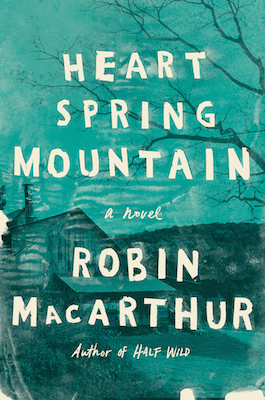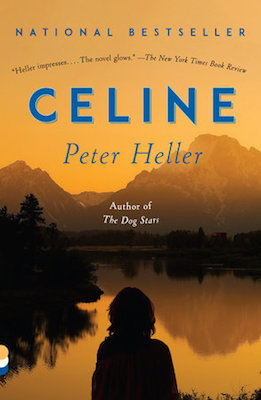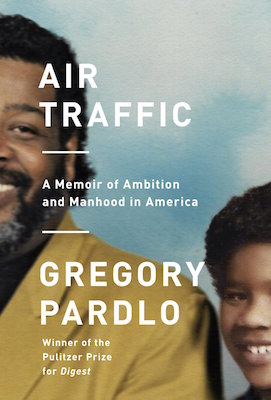Every month, the Writer’s Bone crew reviews or previews books we've read or want to read. This series may or may not also serve as a confessional for guilty pleasures and hipster novels only the brave would attempt. Feel free to share your own suggestions in the comments section or tweet us @WritersBone.
Heart Spring Mountain by Robin MacArthur
Daniel Ford: Sean Tuohy once said that he felt like he was eavesdropping on the characters in John le Carré’s Tinker Tailor Soldier Spy. That’s exactly the reading experience I had with Robin MacArthur’s Heart Spring Mountain. Perhaps it was the Vermont setting (after Tropical Storm Irene’s devastation) or the author's sparse, moving prose. Or maybe it had something to do with Vale’s desperate search for her estranged mother Bonnie that made this novel feel so much more personal and haunting. Whatever the reason, I thoroughly enjoyed getting to know some of the most passionate, emotional, broken, and fiercely independent characters I’ve ever encountered in fiction. MacArthur also earns all the bonus points for mentioning “Helpless,” one of my favorite Neil Young songs.
They Can't Kill Us Until They Kill Us by Hanif Abdurraqib
Daniel: I felt like I was taking a writing course every time I cracked opened Hanif Abdurraqib’s exceptional essay collection They Can't Kill Us Until They Kill Us. Abdurraqib uses his poetic sensibilities to deftly comment on everything from music and pop culture to race relations and familial losses. I recently suffered the loss of a relative, and this paragraph in particular put all of my grief in sadness into perspective:
“I’ve started other years at funerals, in hospital rooms, in studio apartments with my phone off entirely. So in spite of the newest realities that we must confront and stay uncomfortable with, I’m hoping that I get to stick around for a while. I am hoping, mostly, that we all get better at wishing on the things we need, even in darkness.”
Yes, Abdurraqib can flat out write. I look forward to following his work going forward.
Rabbit Cake by Annie Hartnett
Daniel: I loved every word of Annie Hartnett’s Rabbit Cake. After a mother tragically drowns, a family slowly becomes unglued. Your heart would ache on every page if not for main heroine Elvis Babbitt’s curiosity and pluck. From the father’s parrot that speaks in their mother’s voice to Elvis’ psychologically fragile sister Lizzie, hell-bent on setting a world record in “rabbit cake” baking, this novel will have you laughing and crying in equal measure.
The Smart One by Drew Yanno
Sean Tuohy: A sleek and fast thriller that would make Robert Ludlum proud. Screenwriter Drew Yanno's The Smart One is the type of thriller you rarely find on bookshelves. Tightly written, the novel follows a noted author living in semi-retirement who is called by the widow of a small-town doctor. Hidden in her late husband's belongings she has found a list of names. Soon the author finds himself in the crosshairs of deadly men who want the list back. Yanno writes at a clipped pace but doesn’t lose any of the character or story. This is a "strap yourself in" kind of novel.
Dreamland by Sam Quinones
Daniel: Sam Quinones’ exploration into the opioid crisis reads like a thriller. He tracks the epidemic’s rise from a small drug trafficking state in Mexico to Midwestern towns softened by economic distress and doctors overprescribing pain medication. Paired with his testimony to a Senate subcommittee investigating the crisis, Quinones’ narrative not only provides necessary background information for current events, but also offers some possible long-term solutions for struggling communities. Dreamland is essential reading, and a worthy testament to the power and promise of shoe-leather journalism.
Your Song Changed My Life by Bob Boilen
Mike Nelson: For almost two decades, Bob Boilen has hosted NPR's "All Songs Considered," a show that serves as a platform for new music (and new musicians) to get to the ears of hungry music lovers. In other words, to get into my ears. In discovering and featuring [typically young] artists, Bob (can I call him Bob?) gets to talk to them, gets to know them, and gets to package their stories up into a great little book. In Your Song Changed My Life, Bob (I'm calling him Bob) talks to 35 different musicians about the songs that inspired them. It's unpredictable, it's enlightening, and it's a fascinating way for me to get my hands on ideas of old music to listen to. This thing spans from Smokey Robinson and Jimmy Page to Leon Bridges and St. Vincent, so even if you don't want to read the whole thing (which is less than 300 pages, so, grow up), you can borrow it from a library or from me I guess, and just pick out the stories you want to know.
The Wanted by Robert Crais
Daniel: A near-perfect thriller. Robert Crais’ no-frills writing and witty dialogue make an intriguing plot even more enjoyable. It all starts with a worried mother whose concerns grow after discovering her son is flashing new clothes and jewelry. Once Elvis Cole starts digging into the case, all hell deliciously breaks loose. Cole and his stoic partner Joe Pike will be making plenty of return appearances on my reading list.
Winter Of The Wolf Moon by Steve Hamilton
Sean: Steve Hamilton never disappoints. The second in the much beloved Alex McKnight series finds the sometimes-PI helping a young woman who believes she’s in danger. When she disappears, he must find her before it’s too late. You feel comfortable in McKnight’s world (despite the suspense) and you’re happy to see familiar faces. The mystery at the core of the story pulls you in, but you stay for the characters.
Neon in Daylight by Hermione Hoby
Daniel: I’m a sucker for a New York story, and this is an exceptional one. I can feel the heat from the summer of 2012 bubble up under Hoby’s intoxicating prose and creep back under my skin. This line in particular hooked me early on:
“It was only now—a master’s degree completed dutifully, pointlessly; a commitment to a Ph.D. made miserable, uncertainly—that she realized the world truly did not give one single shit whether you’d done your homework.”
Amen. Plus, there’s a cat named Joni Mitchell.
The Woman in the Window by A.J. Finn
Daniel: Plenty of thriller/mystery/crime novels have featured unreliable narrators since Gone Girl and The Girl on the Train debuted. Which is why I went into A.J. Finn’s The Woman in the Window with some trepidation. However, once I met Anna Fox, a troubled acrophobic woman, and read his outstanding prose, any and all doubts were erased. This book is sensational. Yes, there were suspenseful moments. Yes, you had a red herring or two. But the meat of the book is really about this woman, what she’s dealing with, and how people in general deal with and struggle through loss. It’s a character study wrapped in a good mystery. Pour a glass of wine (or ten), keep an extra light on, and allow your heart to palpitate with every page.
Boys Among Men by Jonathan Abrams
Mike: This is the stage of my life where I'm obsessed with the NBA. And let me tell you something about the NBA. It has the absolute best characters and best stories in sports. Jonathan Abrams took a fascinating angle to tell a great number of stories in his second book, Boys Among Men. Abrams takes a look at all the high schoolers who jumped (or tried to) straight into the NBA from 1995-2005, before a new age minimum was enforced to enter the league. This is not a book about basketball; it's a book about stories. It has triumphs, tragedies, and players needing their friends to bring them trash bags full of clothes at the airport because they're so inexperienced they don't know to pack a bag when you travel. What more do you want?
Celine by Peter Heller
Daniel: When I first read Peter Heller’s debut novel The Dog Stars, I thought there would be no way he was ever going to top it. Heller ended up raising the bar with The Painter in 2015, and then delivered an unforgettable main character last year in Celine. Celine is an older, aristocratic PI who works out of her Brooklyn apartment and has an absurdly good success rate. With the help of her monosyllabic, but highly competent, husband, Celine sets out to track down a damaged young woman’s missing father (who is presumed dead by all accounts). All of that is fine and good, but it’s to Heller’s credit that he takes deep dives into all his characters’ backstories. His prose is a joy to read, and the themes he touches on meld so well with the characters that populate this world. I could read an endless series about Celine and her cohorts.
Two Kinds Of Truth by Michael Connelly
Sean: Harry Bosch is back! I love when the grizzled Los Angeles detective returns to bookshelves. Bosch finds himself in a tough spot when an old case comes back to haunt him. Connelly knows how to design a fast-paced and heavily detailed story that yanks readers by the collar and takes them on a journey.
Class Mom by Laurie Gelman
Daniel: Jen Dixon’s crackling sass is just what you need to survive the winter. She’s a badass kindergarten class mom who really does have a heart of gold. Laurie Gelman’s debut is consistently hilarious while also empathetically touching on universal themes.
Into the Black Nowhere by Meg Gardiner
Daniel: Clear your sleep schedule. Cancel all other reading. Meg Gardiner’s follow up to UNSUB drops Jan. 30.
Author’s Corner
By Erica Wright, author of All the Bayou Stories End with Drowned (out now from Black Lawrence Press) and The Blue Kingfisher (out Oct. 9, 2018 from Polis Books).
Indictus by Natalie Eilbert
While calling a new poetry release “hotly anticipated” always seems like an inside joke, I have been eagerly waiting for this collection. Eilbert’s lyricism is simultaneously tough and vulnerable, an acknowledgment of the defenses necessary to survive in an increasingly cruel world. Moreover, her poems live in our modern age, never shying away from mentions of technology or even the occasional Applebee’s. In “The Limits of What We Can Do,” which appeared in The New Yorker, she writes, “I like poetry because there are no miracles in it.” Perhaps no miracles, but Eilbert’s poems do possess a beguiling forthrightness and Indictus—which confronts issues of sexual assault—couldn't be more important for our time.
Walk in the Fire by Steph Post
This aptly named sequel to Lightwood burns with a dangerous intensity. Post has created one of the most memorable gothic noir novels in recent memory. In this outing, Judah Canon begins to embrace his family’s criminal obsessions, trying to fill his father’s shoes without putting his loved ones in danger. That plan quickly falls apart in a thriller populated by all manner of malcontents in backwoods Florida, including a snake-loving preacher lady more interested in green than God.
Mama Amazonica by Pascale Petit
This unique and timely collection explores Petit’s traumatic childhood through the lens of ecology. As with all the best fables, pain is transformed, becoming something more manageable. Specifically, the mother here is viewed as a variety of animals and flowers. In her masterful poem “King Vultures” (which we published in Guernica), Petit imagines her life in reverse, beginning with her mother’s death and ending with her own birth. When writes, “The king vultures have followed me in / and someone is zipping up my roof with a scalpel,” it’s hard not to shiver at the raw intensity. In her award-winning collections, Petit creates her own, new mythological.
Bird Odyssey by Barbara Hamby
Air Traffic by Gregory Pardlo
I’ll resist making a bad “Planes, Trains & Automobiles” joke while mentioning that two of my favorite poets have nonfiction books coming out later this year. Hamby’s Bird Odyssey exposes the writer’s love of travel, taking her readers through Siberia, Memphis, Ithaka, and beyond. In Air Traffic, Pardlo considers his volatile relationship with his father, an air traffic controller who lost his job after participating in a strike. Pre-order thumbs ready, right?
Listen to our most recent podcast with Erica Wright:
#NovelClass
The new #NovelClass spin off launches on Feb. 1!
Dave Pezza will be hosting the podcast’s first live event on Feb. 21 in Providence, R.I. We’ll be discussing Stephen King’s The Shining.
Listen to Dave Pezza's introduction to NovelClass Season 2 on SoundCloud!



























